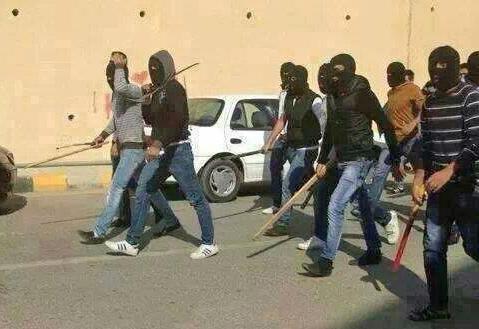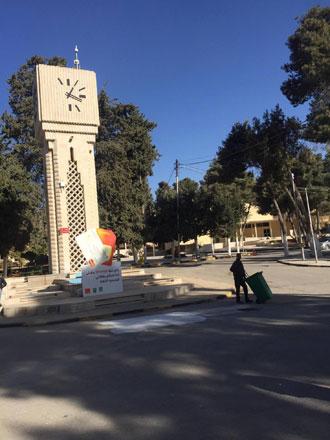You are here
Addressing campus violence remains unfinished business as debate goes on
By Omaymah Al Harahsheh - Sep 04,2017 - Last updated at Sep 05,2017

Violence on campus is a multifactoral issue that remains unresolved, experts say (File photo)
AMMAN — Instead of graduating with his colleagues from the faculty of archaeology and tourism this summer, Ahmed left the university with 99 credit hours to work as a salesman at a shoe store in Amman.
He was expelled for direct involvement in “campus violence”, along with other students.
“I am constantly living in a state of ‘what ifs’,” he said in a recent interview with The Jordan Times. “Had the university not expelled me last November, I would have probably been able to pursue my dream of becoming a university professor. I do not deserve this,” he added.
This kind of “banishment” that Ahmed received as a punishment is not the first of its kind, nor is the campus quarrel that took place at his university. Final expulsion from educational institutions has long been seen by education administratives as an axiomatic article in the student penal law for a severe behaviour like violence.
“It is the student’s responsibility to read the student code of conduct to learn that violence on campus is punishable by expulsion,” Hussein Khuzaay, a professor of sociology at the University of Jordan told The Jordan Times.
From sport stadiums to parliamentary debates, Jordanians witness forms of violent expression as an everyday phenomenon that manifests a desperate need to eradicate a deeply entrenched system of failed adequate communication among the young and elderly alike.
However, observers and social experts are more alarmed by the fact that this culture of verbal and physical violence has trespassed the gates of university campuses infecting a vital segment of the population: candidates of higher education degrees — whom, many Jordanians agree, are the country’s “best bet” for a better future and its most potent forerunners.
Violence on university campuses is an issue of constant rising concern. The underlying factors behind the rise and intensity of this dilemma are convoluted and its implications vary — a quality that makes the problem all the more difficult to address and resolve by decision makers.
Ahmed was among few students who were expelled from the University of Jordan for engaging in a violent quarrel on campus that disturbed the education process and threatened the safety of students. The punishment handed down to the 24-year-old denies him the right to pursue his undergraduate education in the Kingdom permanently.
During the interview, Ahmed claimed to be innocent of all of the allegations, but whether that is the case is another topic. The issue that Ahmed’s case sheds light on is the sort of punishment given for campus violence. When it comes to final expulsion as a punishment, Khuzaay states that “final punishment is not the solution to violent behaviour. This problem has a threefold cause that includes the university administration, the student, and the tribal society that fosters violent and vengeful tendencies and paints them as manly and heroic when done in defence of a tribe member”.
Ahmed reiterates Khuzaay’s point saying: “The fact that they dumped me to the street and called that a solution to the problem is problematic in itself”, he said.
The professor notes that if a problem, such as campus violence, originates from the society, final expulsion will only return the violent mentality to the streets elongating the lifespan of the problem and maintaining the cycle. He states that “an alternative productive punishment is preferable to final expulsion where misbehaviours can be converted into beneficial actions to the university and the society as a whole through hours of social work, for example”.
While this alternative solution was welcomed by several university students who were interviewed by The Jordan Times, one student who witnessed the November quarrel at the University of Jordan said that “the [social work] punishment is not severe enough to scare off those students with a tendency to disrupt our education and threaten our lives with their smuggled weapons”.
With these clashing views in mind, it seems to many that the real glimmer of hope in this whirlpool lies in a pre-emptive strategy. After all, the old saying goes: “Prevention is better than cure”, which is what the Secretary General of the Higher Education Ministry Ahed Wahadneh emphasised.
He noted that while campus violence is “a multifactorial problem resulting from unresolved tensions at the wider economic, social and political levels”, the immediate, effective solution is to exhaust students’ energy and time in productive work leaving no time for quarrels.
“One would not expect students with violent tendencies to go to extracurricular activities during their free time, so we will have to bring those to them instead,” he added.
“University administrations are capable of erasing this problem on their own”, Wahadneh said, noting that they should make all students, and not only the top achievers, feel like they are stakeholders in the education process inside and outside the classrooms.
“When you focus on giving leadership roles and extracurricular opportunities to good students only, you are missing out on the rest, giving them more free time that will probably go uninvested and that is a pitfall,” Wahadneh added.
Furthermore, the spokesperson of the Higher Education Ministry and head of the campus violence committee, Mahmoud Khalayleh, affirmed that the issue is a priority on the government’s agenda for the significance of education in the country.
He noted that some of the solutions that have been implemented include strengthening campus security, changing the admission system to accept only those who will respect the institution and its laws, and incorporating the principles of peaceful dialogue and active forms of communication into the taught curricula.
“Rates of campus violence are decreasing,” Khalayleh assured.
The problem, however, remains a concern to university students and their families. Many students attribute this concern to the necessity of peaceful communication in today’s world, especially in this region. Their worries convey a simple message: for a country that lies in the heart of a region where instability and chaos are a norm, fruitful communication, peaceful expression and tolerance of others’ differences become not only crucial for the prosperity of the country and its people, but for the very mere survival of both.
For Ahmed and the others rejected by the education system, it might be too late to consider peaceful means to resolve conflicts.
Related Articles
AMMAN — The National Campaign for Defending Students’ Rights (Thabahtoona) on Saturday blamed parties outside the University of Jordan (UJ)
AMMAN — The Tafileh Technical University administration is reviewing its decision to expel 11 students for celebrating their own and colleag
AMMAN — The National Campaign for Defending Students’ Rights (Thabahtoona) on Sunday issued a press statement expressing “shock” over












